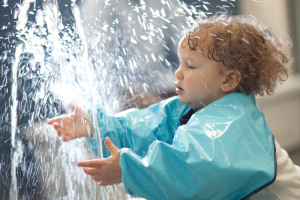By Cecilia Clark
As human beings, we’re lucky. Every day we get to make a choice about our attitude, our outlook and what we want to do with our lives. Just as New Year resolutions offer the opportunity to make improvements on a large scale – goal-setting can happen throughout the year for all ages. Helping kids learn how to set and achieve goals is a valuable skill to hone early in life.
To help young children get familiar with personal commitments and set goals, you’ll want to set them up to succeed. That means keeping things simple and positive. Dr. Kathleen-Pearson, a clinical assistant professor of pediatrics at the University of North Carolina School of Medicine, suggests resolutions for preschool-aged children be focused on improving their listening and helping skills. “I will listen when Mommy or Daddy is explaining something to me,” or, “I will pick up my toys every day before bedtime,” are two examples.
Other age-appropriate examples for preschoolers are:
- Washing one’s face every night
- Brushing teeth twice a day
- Trying a new food every week
Setting goals with children can begin in earnest after preschool. This process activates your child’s executive function so they can better control their attention, focus, and think about multiple concepts while managing their time effectively. Who doesn’t need practice with these skills, regardless of age?
Here’s a few simple steps for helping your children set and reach their goals.
- Help your child with realistic goals. Talk with your child about realistic goals and avoiding far-reaching ones that may not be possible or play to their strengths. If your daughter wants to be a famous movie star, help her scale the goal to be age-appropriate and more attainable. Maybe she first starts by taking a drama class. Make sure your child sets the goal, but then help them to be realistic. Many people find it useful to write their goals down.
- Create stretch goals within reach. We all relish the feeling of success after meeting a goal, especially if we worked hard to get there. You may need to nudge your child to establish a more ambitious goal that’s slightly out of their comfort level. You’re helping your child stretch themselves, push a little harder, and learn the lesson that there’s merit in trying even if they don’t achieve their goal the first time, but get very close.
- Establish clear goals. Don’t let the goal be too vague or general. It needs to be measurable to help kids define what success looks like. Saying they want to be the best soccer player on the team is pretty broad, but saying they want to score at least one goalie in each game is more specific and to scale.
- Break into manageable steps. It can be challenging to keep big goals and resolutions because they can seem overwhelming. Work with your kids to break down their goals into small, manageable steps. If your child wants to run a marathon, then maybe a good goal is to start training by running a few miles with the goal of doing a 5K, 10K, then a half-marathon, and ultimately, a marathon.
- Monitor progress along the way. It’s important to teach your kids to do check-ins and monitor their progress. Encourage your child to create their own ways of tracking their efforts. Monitoring progress and making course corrections is all part of goal-setting. Developing a system that works for your child is critical and will serve them well throughout their life.
Everyone loves the feeling of achievement – especially when it comes with praise from a parent. Reviewing goals together is a time to acknowledge successes and emphasize what needs more work or modification. Discussing together and offering suggestions and tips, without any punishment, is critical. Sharing the difficulties you’ve faced as an adult may also be beneficial and shows your child that everyone struggles with change, regardless of age.
This popular acronym is a great cheat sheet to help you support your child. It’s called “smart goal-setting” for kids.
S – Specific
M – Measurable
A – Achievable
R – Relevant
T – Time-bound
Helping your child learn how to set goals and monitor their progress is an opportunity to grow together as a family and a way to teach valuable life lessons so your child can experience the joy of achievement.

